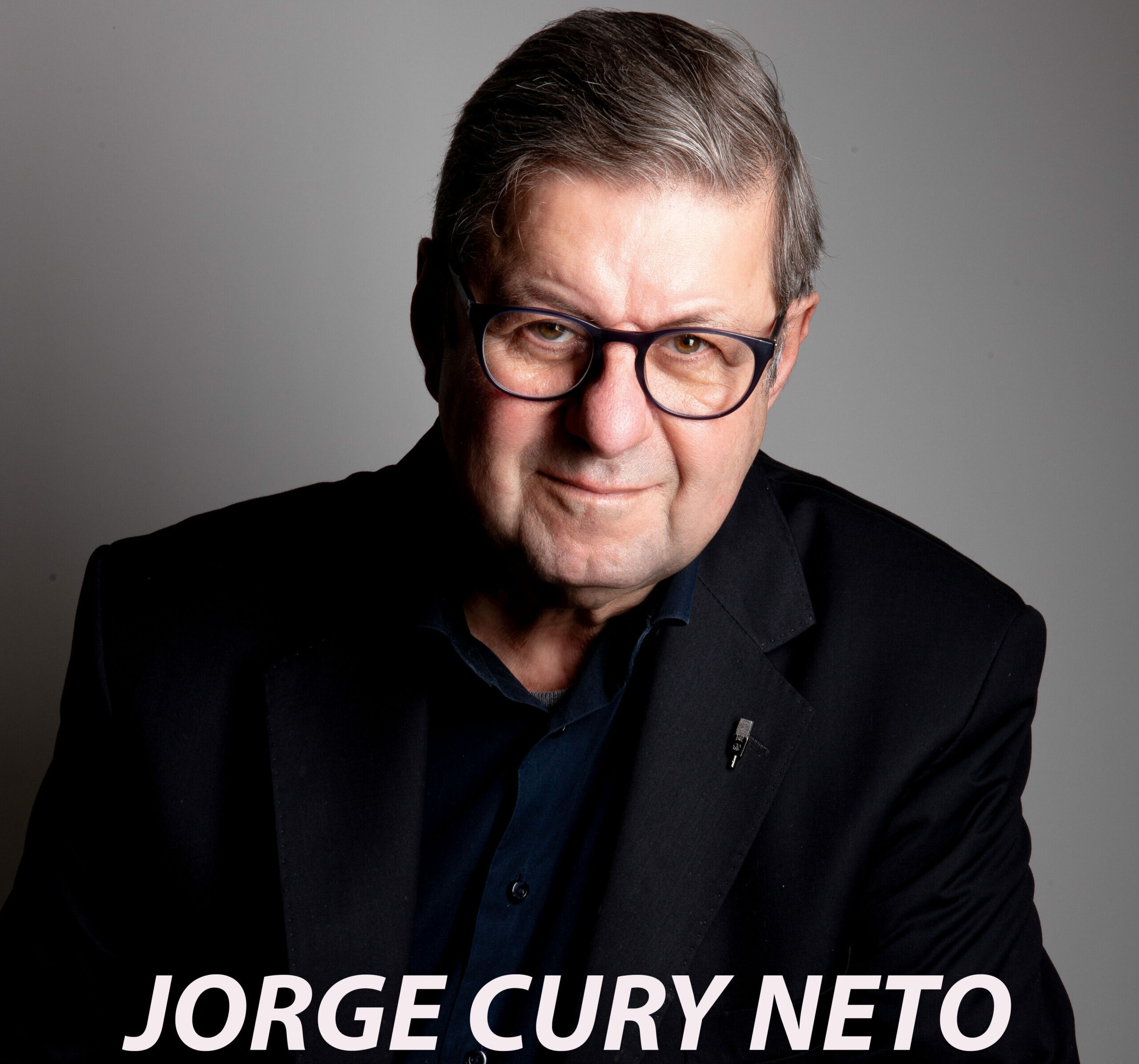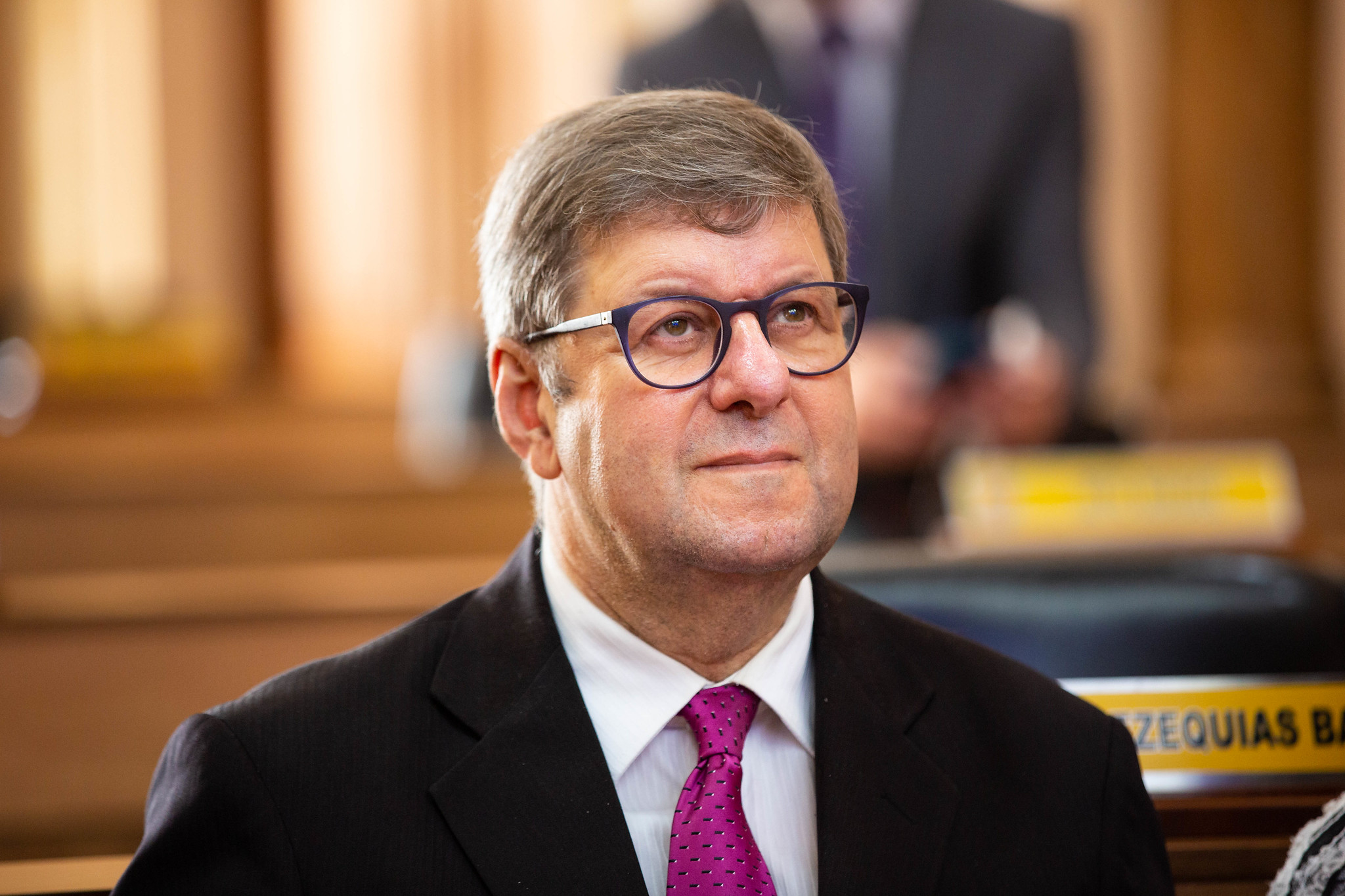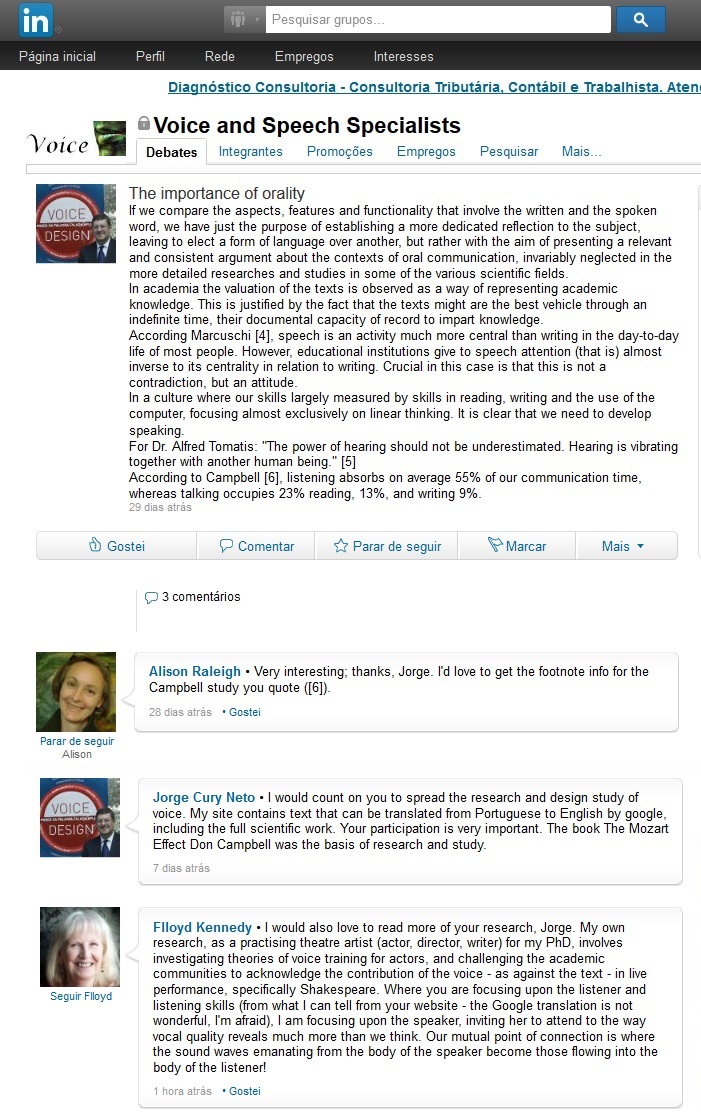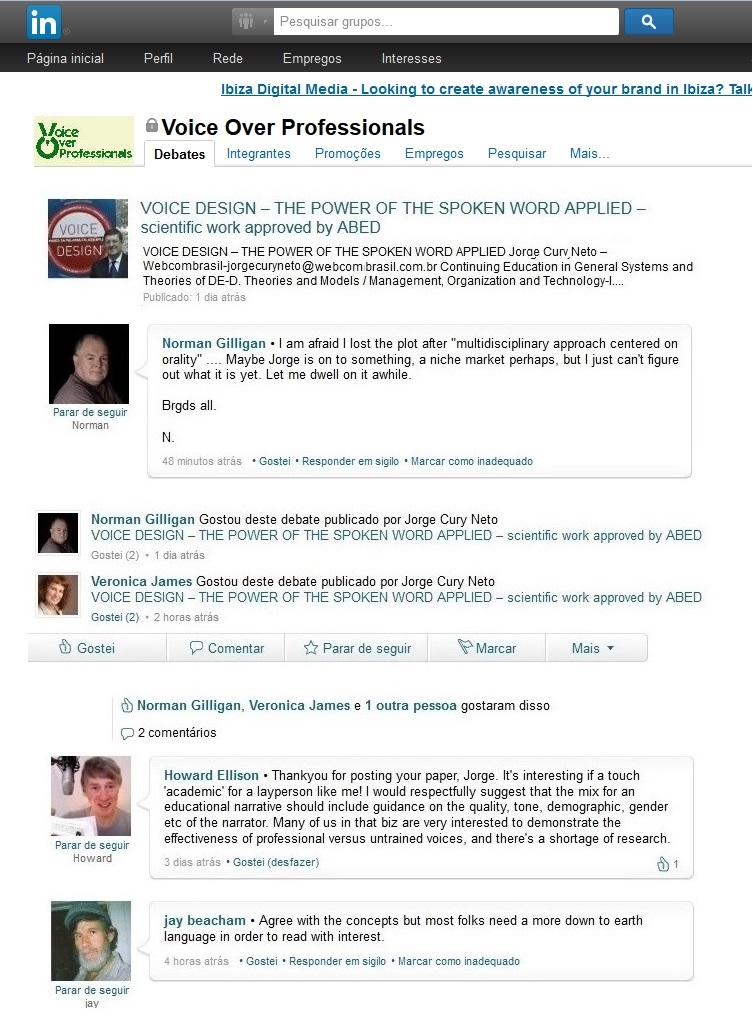Alison Raleigh • Very interesting; thanks, Jorge. I’d love to get the footnote info for the Campbell study you quote ([6]).
Alison Raleigh • Muito interessante, graças, Jorge. Eu adoraria ter a informação de nota para o estudo Campbell você cita ([6]).
Flloyd Kennedy • I would also love to read more of your research, Jorge. My own research, as a practising theatre artist (actor, director, writer) for my PhD, involves investigating theories of voice training for actors, and challenging the academic communities to acknowledge the contribution of the voice – as against the text – in live performance, specifically Shakespeare. Where you are focusing upon the listener and listening skills (from what I can tell from your website – the Google translation is not wonderful, I’m afraid), I am focusing upon the speaker, inviting her to attend to the way vocal quality reveals much more than we think. Our mutual point of connection is where the sound waves emanating from the body of the speaker become those flowing into the body of the listener! 1
Flloyd Kennedy • Eu também gostaria de ler mais de sua pesquisa, Jorge. Minha própria pesquisa, como um artista de teatro praticante (ator, diretor, escritor) para o meu PhD, envolve investigar teorias de treinamento de voz para atores, e desafiando a comunidade acadêmica para reconhecer a contribuição da voz – como contra o texto – em apresentação ao vivo , especificamente Shakespeare. Onde você está se concentrando sobre o ouvinte e compreensão oral (desde que eu posso dizer a partir do seu site – a tradução do Google não é maravilhoso, eu tenho medo), eu estou focando o alto-falante, convidando-a para assistir à maneira como a qualidade vocal revela muito mais do que pensamos. O nosso ponto mútuo de conexão é, onde as ondas sonoras emanando do corpo do alto-falante se aqueles que flui para dentro do corpo do ouvinte!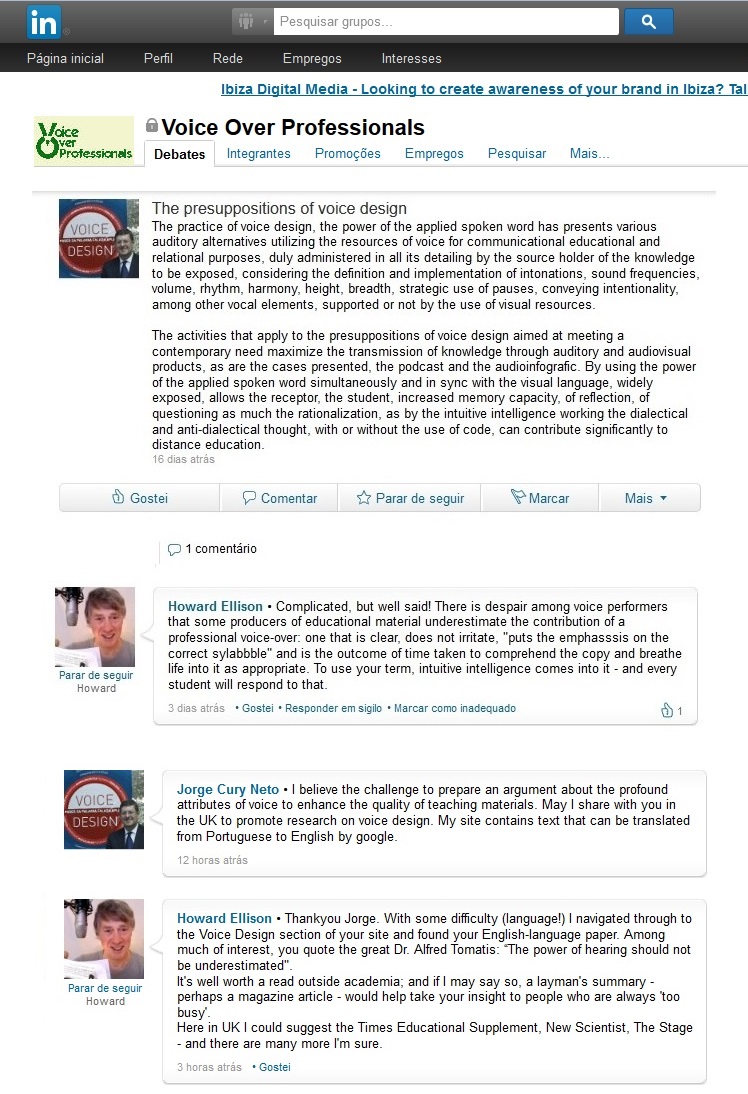
Howard Ellison • Complicated, but well said! There is despair among voice performers that some producers of educational material underestimate the contribution of a professional voice-over: one that is clear, does not irritate, “puts the emphasssis on the correct sylabbble” and is the outcome of time taken to comprehend the copy and breathe life into it as appropriate. To use your term, intuitive intelligence comes into it – and every student will respond to that.
Howard Ellison • Complicado, mas bem dito! Não há desespero entre artistas de voz que alguns produtores de materiais didácticos subestimar a contribuição de um profissional da voz-over: um que é claro, não é irritante “, coloca o emphasssis no sylabbble correto” e é o resultado do tempo necessário para compreender o copiar e dar vida a ele, conforme apropriado. Para usar o termo, a inteligência intuitiva vem nele – e cada aluno vai responder a isso.
Howard Ellison • Thank you Jorge. With some difficulty (language!) I navigated through to the Voice Design section of your site and found your English-language paper. Among much of interest, you quote the great Dr. Alfred Tomatis: “The power of hearing should not be underestimated”.
It’s well worth a read outside academia; and if I may say so, a layman’s summary – perhaps a magazine article – would help take your insight to people who are always ‘too busy’.
Here in UK I could suggest the Times Educational Supplement, New Scientist, The Stage – and there are many more I’m sure.
Howard Ellison • Obrigado Jorge. Com alguma dificuldade (language!) eu naveguei até a seção de projeto a Voz do seu site e encontrou o seu papel de língua Inglês. Entre muita coisa interessante, você cita o grande Dr. Alfred Tomatis: “O poder da audição não deve ser subestimada”.
Vale bem a pena uma leitura fora da academia, e, se assim posso dizer, o resumo de um leigo – talvez um artigo de revista – ajudaria a levar a sua visão para pessoas que estão sempre “muito ocupado”.
Aqui no Reino Unido eu poderia sugerir o Número Educational Supplement, New Scientist, The Stage – e há muitos mais, tenho certeza.
Norman Gilligan • I am afraid I lost the plot after “Multidisciplinary approach centered on orality” Maybe Jorge is on to something a niche market perhaps, but just can’t figure out what it is yet. Let me dwell on it awhile.
Norman Gilligan • I am afraid I lost the plot after “Multidisciplinary approach centered on orality” Maybe Jorge is on to something a niche market perhaps, but just can’t figure out what it is yet. Let me dwell on it awhile.
Howard Ellison • Thankyou for posting your paper, Jorge. It’s interesting if a touch ‘academic’ for a layperson like me! I would respectfully suggest that the mix for an educational narrative should include guidance on the quality, tone, demographic, gender etc of the narrator. Many of us in that biz are very interested to demonstrate the effectiveness of professional versus untrained voices, and there’s a shortage of research.
Howard Ellison • Obrigado por postar seu papel, Jorge. É interessante se um toque ‘acadêmico’ para um leigo como eu! Eu respeitosamente sugerir que a mistura para uma narrativa educacional deve incluir orientações sobre a qualidade, o tom, demográficas, etc do narrador gênero. Muitos de nós em que negócios são muito interessado em demonstrar a eficácia de vozes profissionais contra destreinado, e há uma escassez de pesquisas.
Jay Beacham • Agree with the concepts but most folks need a more down to earth language in order to read with interest.
Jay Beacham • Concordo com os conceitos, mas a maioria das pessoas precisa de um mais baixo a linguagem terra a fim de ler com interesse.
